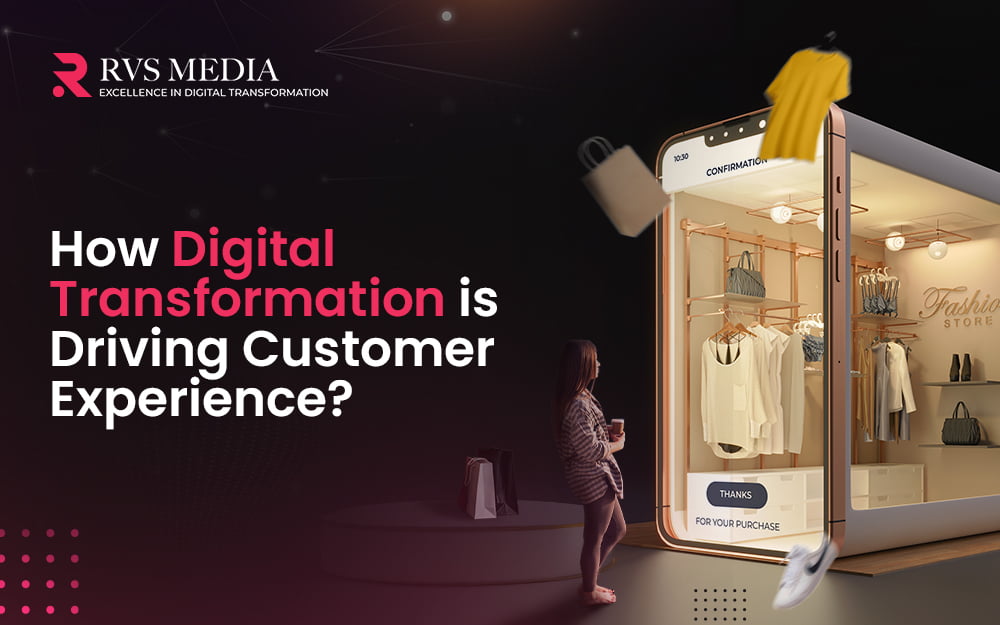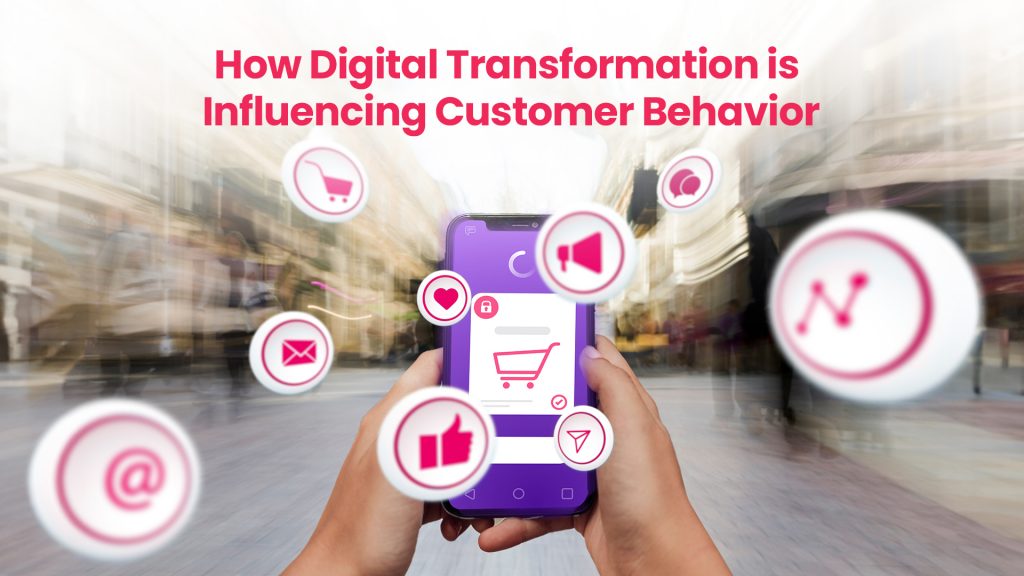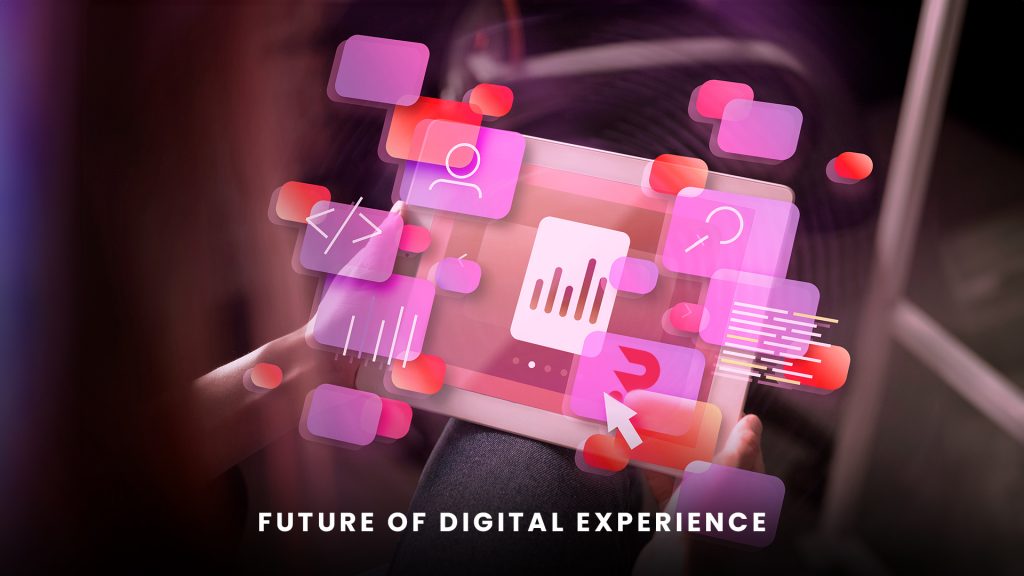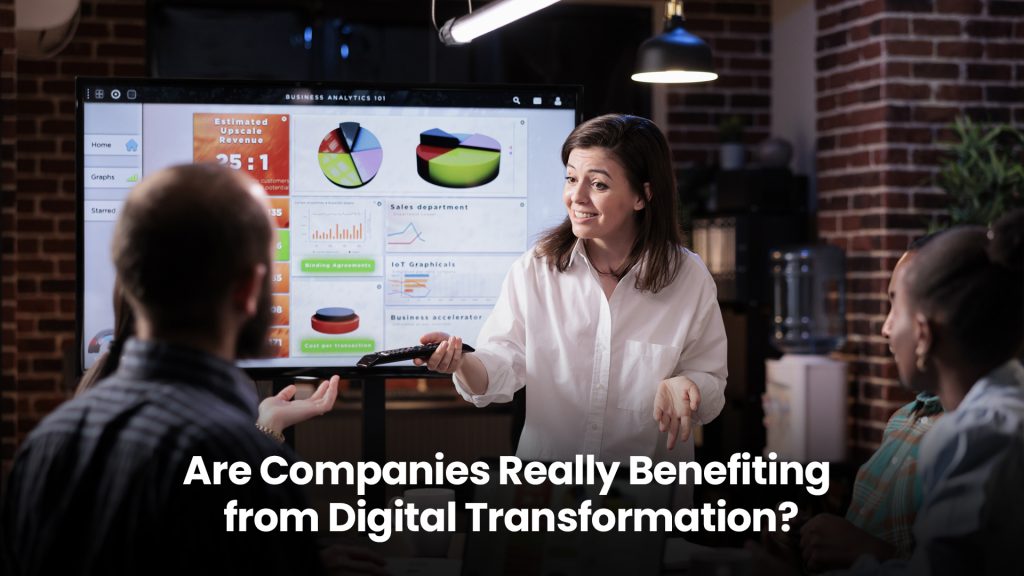How Digital Transformation is Driving Customer Experience in 2024
- Jan 4, 2024
- By Tanisha Sharma

In a world where screens are our windows to reality and clicks speak louder than words, the landscape of customer experience is undergoing a seismic shift. Imagine a journey where every touchpoint with a brand feels tailor-made, every interaction seamless, and every need preemptively met. That’s the promise industrial digital transformation holds—a revolutionising force reshaping how businesses engage and delight their customers.
What is Digital Transformation?
Digital transformation process is the radical overhaul that turbocharges businesses with technology, turning a corner store into a global online marketplace. Imagine your favorite local bookstore launching a website and app, offering books worldwide.
It’s not just about selling online; it’s about using tech for smoother operations, personalised recommendations, and reaching customers beyond borders. It’s like adding wings to a store, propelling it into the digital stratosphere.
The Role and Impact of Digital Transformation in Today’s World
In the heart of this digital epoch, change isn’t just a ripple; it’s a tsunami reshaping how we live, work, and connect. Digital transformation technology isn’t just a buzzword; it’s a symphony of innovation reshaping the world as we know it.
Come, let’s traverse this digital landscape and uncover its profound impact on our lives.
- Seamless Connectivity: Imagine a time when booking a stay meant limited choices within your vicinity. Then came Airbnb, a trailblazer in the hospitality realm. It obliterated geographical constraints, connecting globetrotters to unique stays worldwide.
Suddenly, a quaint cottage in the Italian countryside or a chic loft in Tokyo became as accessible as booking a local hotel. The traditional hospitality industry was turned on its head by this digital disruptor, illustrating the power of seamless connectivity in transforming the way we travel and experience new cultures. - Personalisation: Enter the world of Netflix, where your watchlist feels tailor-made just for you. Their recommendation algorithms are the wizards behind this magic, analyzing your viewing habits and curating content that aligns perfectly with your preferences.
It’s akin to having a personal movie curator who always knows what film will captivate you next. This level of personalisation elevates our entertainment experience, showcasing the impact of data-driven insights in shaping our choices. - Agile Adaptability: In the wake of unforeseen challenges like the pandemic, businesses that swiftly embraced digital platforms flourished. Additionally, Zoom became more than just a video conferencing tool.
It became the bridge keeping teams connected, transforming how we work and collaborate. Remote work tools became the lifeblood of businesses, highlighting the adaptability that digital transformation solutions company offers in times of crisis.
These advancements not only streamline operations but also enhance the overall customer experience, showcasing the efficiency digital transformation technologies brings to traditional industries.
How Digital Transformation is Influencing Customer Behavior?
Beyond its impact on businesses, corporate digital transformation has wielded an immense influence on how consumers navigate their choices and preferences, altering the very fabric of their behavior.

- Social Media’s Purchase Power:
Think about your last online purchase—did it originate from a captivating Instagram post? Social media isn’t just a platform for connections anymore; it’s a bustling marketplace.
Platforms like Instagram have seamlessly integrated shopping features, transforming your scroll into a virtual storefront. That stunning dress or those trendy sneakers showcased by influencers aren’t just aesthetically pleasing; they’re direct pathways to purchase decisions.
The lines between inspiration and transaction blur as social media becomes a marketplace in itself, significantly shaping what consumers buy and why. - Subscription-Based Paradigm:
The days of owning physical CDs or DVDs seem like relics of the past. Enter the era of Spotify, Netflix, and other subscription-based models. Consumers no longer seek ownership; they crave access and convenience.
With a monthly fee, they unlock a treasure trove of music, movies, or even meal kits. This shift from ownership to access exemplifies how digital transformation in business has redefined value for consumers. It’s not about possessing; it’s about experiencing without the burden of ownership. - Omnichannel Expectations:
Consider the Starbucks mobile app—your gateway to a seamless coffee experience. It’s not just an app for placing orders; it’s a bridge between your online preferences and the offline world. You customise your drink, pay in-app, and simply pick it up at your chosen store.
This blend of online-offline integration embodies the omnichannel experience consumers now crave. They desire a seamless transition between digital interactions and physical experiences, where their preferences seamlessly traverse both realms.
Starting with Digital Transformation – The First Steps
Ex:
- Define Objectives:
Start by assessing your business landscape. Identify areas where innovation or improvement is crucial. This could be streamlining internal processes, enhancing customer experiences, or exploring new markets. Establish clear, measurable goals—whether it’s increasing sales, improving customer satisfaction, or boosting operational efficiency. These objectives will guide your transformation roadmap. - Embrace Technology:
Technology is the cornerstone of digital transformation in business. Implementing Customer Relationship Management (CRM) systems allows you to centralise customer data, providing insights crucial for personalised interactions. Automation tools streamline repetitive tasks, freeing up time for strategic initiatives. AI-driven analytics delve deep into data, uncovering patterns and predicting trends that inform better decision-making. - Cultural Shift:
Transformations aren’t just about tech upgrades; they’re about people. Foster a culture that champions innovation, agility, and adaptability. Encourage cross-departmental collaboration and ideation. Ensure that employees are not only receptive to change but actively engaged in driving it. Leadership plays a pivotal role here, setting the tone for embracing change and fostering a culture of continuous improvement. - Customer-Centric Approach:
Place your customers at the core of your transformation journey. Prioritise understanding their needs, preferences, and pain points. Solicit and act upon their feedback actively. Whether it’s through surveys, focus groups, or data analysis, build a comprehensive understanding of your customers’ behaviors and expectations. This knowledge forms the bedrock for creating tailored experiences that resonate with your audience. - Continuous Learning:
In the digital realm, evolution is constant. Stay abreast of technological advancements, market trends, and industry innovations. Encourage your teams to engage in ongoing learning and upskilling. This could involve attending industry conferences, enrolling in relevant courses, or fostering knowledge-sharing sessions internally. Adapting to change requires a proactive approach to learning and evolving alongside the technological landscape.
Future of Digital Experience

The future of digital experience holds boundless opportunities:
- AI-Powered Personalisation: Advanced AI algorithms will anticipate needs, offering hyper-personalised experiences.
- Extended Reality (XR): From augmented reality in retail to virtual events, XR will redefine engagement.
- IoT Integration: Connected devices will create a seamless ecosystem, enabling predictive maintenance and tailored experiences.
- Voice and Gesture Control: Interaction with devices will evolve beyond screens, embracing voice and gesture commands.
- Blockchain Security: Enhanced data security and transparency will build trust between businesses and customers.
Tools and Techniques to Enhance Digital Customer Experience
- CRM Systems: CRM systems organise customer data, enabling personalised interactions and tailored services. They streamline communication across various channels, ensuring a cohesive and satisfactory customer journey.
- Data Analytics: Data analytics tools decipher consumer behavior, providing insights crucial for strategic decision-making. They uncover patterns, preferences, and trends, allowing businesses to optimise their offerings and experiences.
- Marketing Automation: Marketing automation tools facilitate personalised campaigns and targeted messaging. They automate repetitive tasks, ensuring timely and relevant interactions, thereby enhancing engagement and conversion rates.
- AI Chatbots: AI-powered chatbots offer instant and efficient customer support. They provide round-the-clock assistance, resolving queries swiftly and improving overall customer satisfaction.
- Omnichannel Platforms: Omnichannel platforms unify the customer experience across various touchpoints. They enable seamless integration between online and offline operations, ensuring consistency and convenience for customers.
Are Companies Really Benefiting from Digital Transformation?

Numerous case studies and statistics showcase the tangible benefits:
- Increased Efficiency and Productivity: Digital transformation optimises workflows, automates manual tasks, and introduces streamlined processes. By leveraging technology, companies eliminate bottlenecks, reducing turnaround times, and enhancing overall efficiency. Employees can focus on high-value tasks, fostering a more productive work environment.
- Cost Savings through Automation and Streamlined Processes: One of the pivotal advantages of industrial digital transformation is its ability to automate repetitive processes. This not only reduces human error but also cuts down operational costs significantly. Streamlining workflows and utilising automated systems lead to cost savings in labor, time, and resources, contributing to a healthier bottom line.
- Enhanced Customer Satisfaction and Loyalty: Digital transformation places customers at the center of business strategies. By leveraging data insights, companies tailor experiences, anticipating and meeting customer needs effectively. This personalised approach not only boosts satisfaction but also fosters loyalty. Seamless interactions, personalised services, and swift issue resolution contribute to a positive customer experience.
- Expanded Market Reach and Agility in Responding to Market Shifts: Embracing digital transformation technologies equips companies with the agility to adapt to evolving market dynamics swiftly. It allows businesses to pivot strategies, introduce new products or services, and reach broader audiences. Whether it’s harnessing social media platforms or employing innovative marketing tactics, companies can respond nimbly to market shifts, gaining a competitive edge.
Conclusion
In the ever-evolving landscape of digital transformation, RVS Media stands as a beacon for businesses seeking not just change but true revitalisation. As a trailblazer, RVS Media doesn’t settle for the status quo; it orchestrates a symphony of innovation, technology, and customer-centricity, propelling businesses to new heights.
With a proven track record and a commitment to excellence, RVS Media isn’t just a digital transformation solutions company —it’s a partner in shaping unparalleled customer experiences. By seamlessly blending cutting-edge technology with bespoke strategies, RVS Media ensures businesses not only meet but surpass the ever-growing expectations of their customers. In this digital age, where success hinges on digital prowess, RVS Media emerges as the catalyst that breathes life into businesses, positioning them as leaders in the dynamic realm of digital innovation.
 Shopify
Shopify




















